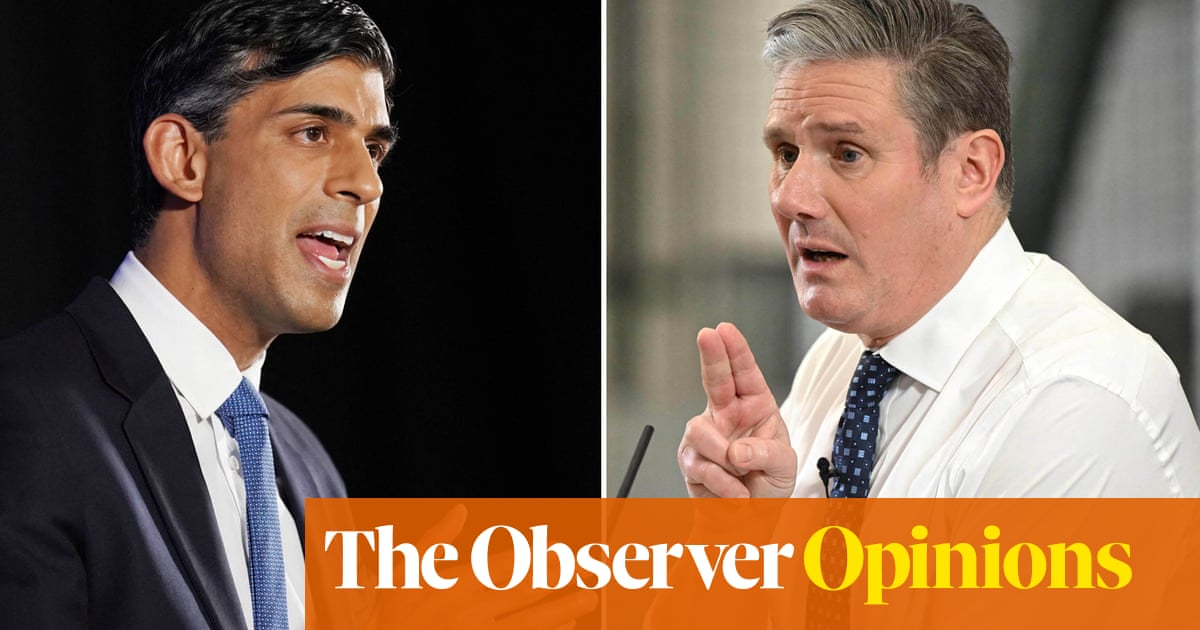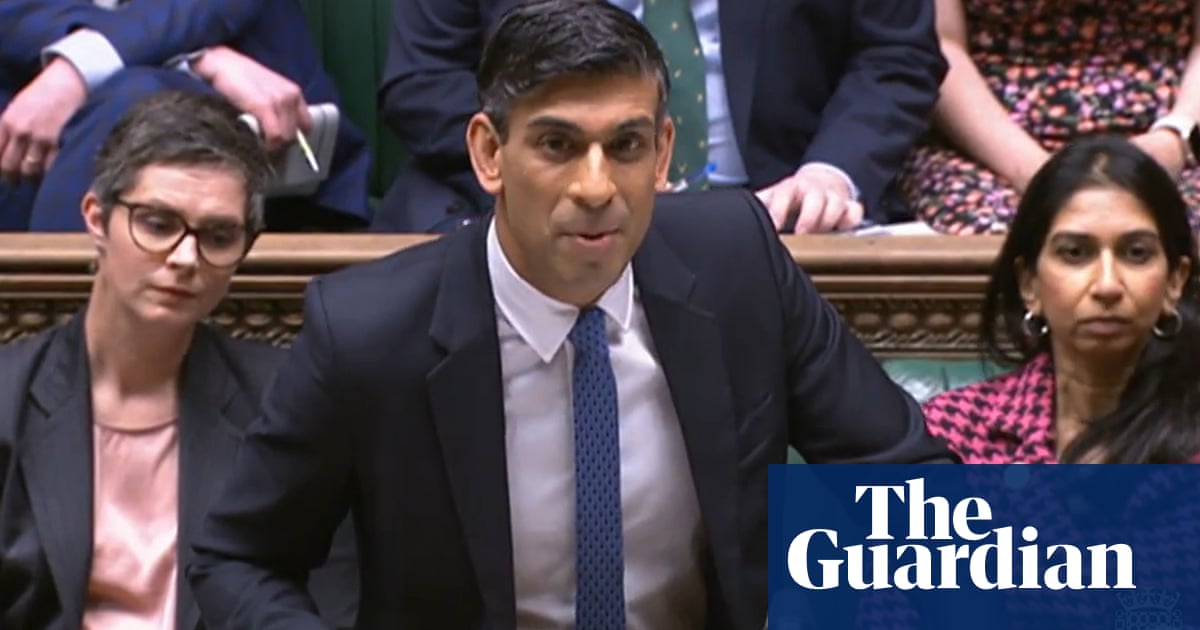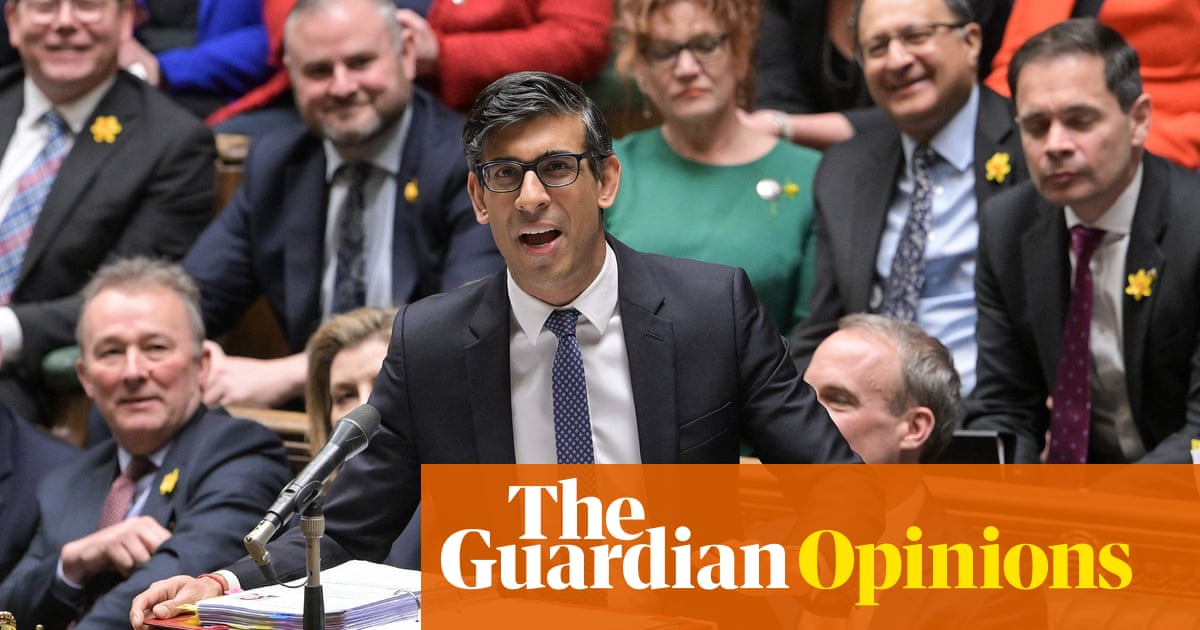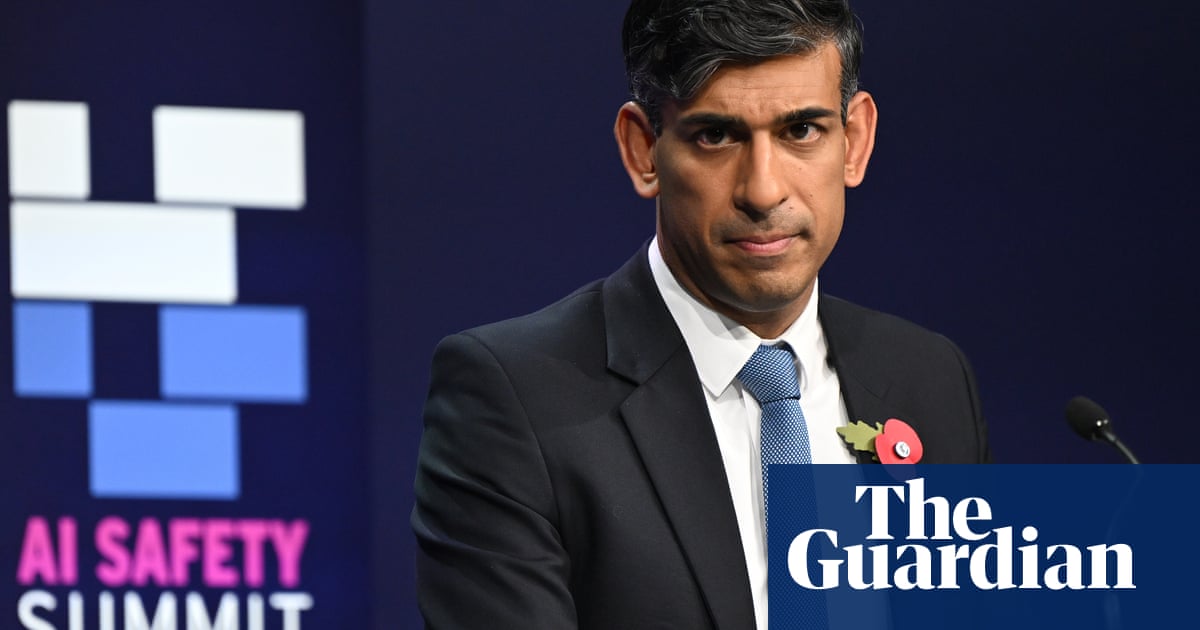
Some people look from Sir Keir Starmer to Rishi Sunak and ask: what’s the difference? They are damned as carbon-copy “socialists” by the hardliners of the right, among whom anyone more moderate than Jacob Rees-Mogg is regarded as a traitor to authentic conservatism. On the wilder shores of the left, where anyone more moderate than Jeremy Corbyn is a betrayer of the true faith, Starmer v Sunak is dismissed as a choice between two Tory prime ministers. It is not just ideological zealots who see them as identikit centrists. Some more sensible folk can be heard wondering whether there’s really that much to choose between them.
This is partly because the prime minister and the leader of the opposition do have more in common than two-syllable surnames which begin with an S. Neither has been in politics all that long, both having only become MPs in 2015, and that inexperience sometimes shows. Both were recruited to rescue their parties from the toxic legacy of a catastrophic predecessor. Both are well-manicured men who never appear with a hair out of place or a speck of fluff on their well-tailored suits. Looking professional matters to them. Both believe that attention to detail and being on top of issues are more important qualities than the ability to deliver a snappy phrase, enthuse a crowd or concoct a lie. It is arguable which of them has the greater contempt for Boris Johnson.
Both think there is some virtue in being described as vanilla-flavoured. They agree that the country is weary of years of Tory psychodrama and voters now have an appetite for unflashy competence and politicians who don’t promise more than they can deliver. Neither man is renowned for spontaneous wit or being light on his feet. Neither has a reputation as a philosopher-prince or as a wizard with oratory.
Both have nevertheless been under pressure to give a Big Speech, one that articulates their credo and defines what they are really about. What Mr Sunak is really about is clinging on for dear life in the hope that the array of crises besetting the country will ease in time to give the Conservatives some chance of being competitive at the next election. What Sir Keir is really about is sustaining his party’s poll lead, exploiting the unpopularity of the Tories and avoiding making any unforced errors that would let the Conservatives back into the game. Neither could admit what they are really about when they delivered their “vision” speeches on successive days at the same venue in east London. “We booked it first,” claimed the Labour leader.
These rival addresses had their similarities. Both employed ritual cliches about the energy of the hard-working British people, because no sane party leader is ever going to describe the electorate as dozy and lazy. Both spoke the language of hope, because voters tend to respond better to optimism than pessimism. The prime minister wants the UK to be “a beacon of science, technology and enterprise” and the Labour leader desires “new internationally competitive growth clusters in high-value industries”. Both talked a lot about “innovation” to try to suggest that they are men of the future.
Mr Sunak aspires to “building a better future for our children and grandchildren”; Sir Keir wants to increase “opportunities for the next generation”. In the battle of the platitudes, it was a score draw. Both speeches channelled some Tony Blair. After a long period when that former prime minister was treated as a persona non grata, especially in his own party, people have come round to thinking that there might be things to learn from the most electorally successful party leader of the last quarter of a century. So Mr Sunak had his “five pledges” while Sir Keir advocated reform of public services. Both made many mentions of “change”. That’s always to be expected from an opposition leader, but was less predictable from a prime minister. This tells us that the Tory leader grasps that the next contest is going to be a “change election”. After such a miserable period, the competition for power will be won by whoever has the most persuasive account of how Britain can be made better.
Both spoke of “tough” choices while avoiding grasping any of the seriously difficult ones. That was especially true of Brexit, a subject that haunts both men. Each mentioned it only in passing and neither confronted its crippling effect on our prosperity.
Both speeches had defensive passages. Sir Keir presents himself as an agent of revitalisation who can resolve Britain’s myriad problems, but he also knows that a lot of swing voters are suspicious that his party itches to spend money that the country does not have. So having said that a Labour government would deliver a “decade of national renewal” and “give people a sense of possibility again”, he added the important caveat that this was not “code” for Labour “getting its big government chequebook out”. I’d like to know which previous Labour governments he thinks were too free with the “big government chequebook”.
The challenge for Mr Sunak was how to pitch himself as the man with a plan to fix Britain when so many of the broken things about this country are of his own party’s making. Telling voters that he will “work night and day” to put things right doesn’t cut it. You don’t get rewards for effort in politics. People want results and they are living unhappily with the outcomes of nearly 13 years of Conservative government. He pledged to bring down inflation, debt and NHS waiting lists, get the economy growing again and curb migration across the Channel. Only then to award himself an alibi for failing by saying that keeping his promises depended on forces “out of my control”.
Neither man came up with a phrase so resonant that it will demand entry in collections of famous political quotations. There was no equivalent of “the lady’s not for turning” from the Tory leader or “the white hot heat of the technological revolution” from the Labour one. That was expecting too much of them.
I think Sir Keir did the superior job. His arguments were more coherent, the content had more substance and his delivery was more assured. Mr Sunak sounded like a man making a speech not because he wanted to, but because his aides had told him he needed to. The Labour leader, who has become a more confident and fluent performer both at the podium and when taking questions from journalists, gave more of an impression of enjoying himself.
Sir Keir was also better than his Tory rival at expressing large ambitions. He articulated his green energy goals with some eloquence as he did with his thinking about redistributing power away from Westminster. It was an audacious gambit to steal Vote Leave’s “Take Back Control” slogan and say it will be the title of legislation to give local communities more say over their destinies. Of course, promising “a completely new way governing” is easy when you are not in government. This is standard fare for opposition leaders. The real test of Sir Keir’s commitment to spreading power away from the centre will be when he is releasing it from his own grip.
Mr Sunak’s attempt at a “big idea” was his suggestion that all teenagers ought to study maths until they are 18. There’s not much point in debating whether or not this adds up when Britain does not have enough maths teachers as it is.
Some say that speeches like these are a waste of the energy of the speakers and the time of the audience because they don’t illuminate anything. I disagree. This battle of the new year speeches signposted the choice that will be presented to Britain whenever the next election comes and in whatever circumstances.
At heart, Mr Sunak is a low-tax, small-government, light-regulation Tory. That is his desired direction of travel. His default view about the state is that it should get out of the way. Tellingly, his one thought about addressing the crisis in the NHS is that more health care should be provided by the private sector.
At heart, Sir Keir believes in a large and activist government, with the levels of taxation implied by that, though he prefers to talk about an “agile state” to make it sound more attractive to the wary.
The power of government to do good and give the country strategic purpose is a critical ideological divide between the two men. That contrast is far more important than their superficial similarities. What’s the difference between them? Much bigger than many think.
Andrew Rawnsley is Chief Political Commentator of the Observer












